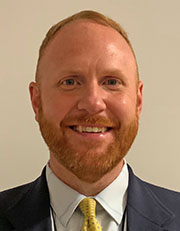The Centers for Disease Control’s approval of a vaccine for 5-11-year-olds provides a new weapon in the battle against the COVID-19 pandemic that has buffeted society for going on two years, Genesee & Orleans Public Health Director Paul Pettit said this morning.
Pettit (pictured at right), speaking to the media via Zoom, continued to spread the word about the effectiveness of the three authorized vaccines – Moderna, Pfizer and Johnson & Johnson – in helping to prevent and reducing the severity of the coronavirus.
He also touched upon this week’s CDC approval (and New York State’s acceptance) of Pfizer’s vaccine for youth in the 5 to 11 age range.
“Under emergency use authorization, it's a little bit different than the full dose Pfizer vaccine for adults,” Pettit said. “It's actually a third of the adult dose, same time period. You're going to have a dose on day one and then you'll also be given a dose 21 days later to be fully vaccinated.
“And again, it'll be two weeks after that second dose that anybody would be considered fully vaccinated. So, it's a five week period, technically, if you look at it from start to finish when you get your first dose.”
He said the one-third dose that was tested showed sufficient antibody response for kids in that age group and has been shown in the trials to be effective at preventing disease and preventing symptoms in those who may again acquire the disease after being fully vaccinated.
Pettit said the COVID-19 vaccines “have undergone the most intensive safety monitoring through the development of it in U.S. history, and vaccinating children will help prevent and protect them from getting COVID-19 and therefore reduce the risk of severe disease hospitalizations and developing long-term COVID complications.”
Children at that age can be carriers of the virus, even if they are asymptomatic, Pettit said.
“They can bring COVID back home to their loved ones, including those that may be more susceptible to severe illness, even if they are vaccinated … So, this is the next tool for us as far as moving forward.”
He said he advises parents to talk to their healthcare providers, mentioning that children – like adults – have varying medical histories.
“We're not giving medical advice here. We are talking about the vaccine and the importance and the role that it will play in protecting children,” he said. "But ultimately, every child has their unique medical history, just like we all do as adults. And we want to make sure that any parents that have any questions or concerns … to become educated, to do your research, to evaluate and look at your own individual situation with your kids and talk to your doctor.”
Pettit spoke on a variety of subjects related to COVID and the activities of the Genesee and Orleans county health departments.
GUIDANCE, RESTRICTIONS IN SCHOOLS
Weekly conference calls with school superintendents continue, Pettit said, adding that, generally speaking, schools are doing well as the health department tracks the number of cases at all districts.
“I would say on average, we're probably around 15 to 20 percent of our active cases are in school aged kids, not necessarily indicating that it's school related spread,” he said. “But these are kids that are positive. So again, that number does vary -- vary up and down.”
The state continues to require masks for everyone indoors at schools – a mandate that has been “frustrating for parents” and “controversial,” Pettit said.
“But ultimately, we have seen a significant improvement in the reduction of quarantines in students this year. And what that has allowed for is better continuity of education. Kids have been able to stay in school and continue to learn in the in-class environment, which is, you know, something that our superintendents have been very vocal about in wanting to make sure we can keep these kids in-person and keep them learning and keep that continuity.”
Pettit mentioned “test and stay” -- a program under consideration by the NYS Department of Health that would allow students testing positive for COVID to remain in school and to avoid a quarantine as long as they are tested every day.
He acknowledged many logistical and supply challenges in implementing this program.
“We are exploring this,” he said. “We're looking at our different funding streams to see if we can … put together the resources to be able to purchase the supplies to get the staffing we need to be able to carry this out.”
Responding to a question from The Batavian on whether discussions are taking place regarding the number of 5-11-year-olds receiving the vaccine and it’s effect on the masking requirement, Pettit said he has not been advised of any verification of what percentage would have to be reached.
He did, however, offer some statistics pertaining to student vaccination rates.
“In Genesee County, the 12-15 age group, we’re at 35 percent vaccinated; the 16-18 at 52.3 percent, and in Orleans County, we’re at 39.1 percent in that 12-15 bucket and 47.1 percent in the 16-18. And the 5 to 11 has just started, so I'm sure we don't have very many there yet,” he said. “But, as far as the masking, that's going to be a decision most likely that's going to be carried out at the state level, not locally.”
POSITIVITY RATES
Pettit said the positivity rates in both counties are hovering around 20 to 30 positives per day, with active cases typically around 200 to 225.
“We have noticed over the last week or two, though, there has been some regional uptick in cases,” he said. “This isn't necessarily something to be unexpected as it is getting colder out … and as we start to come indoors now, there's obviously increased exposure risk, not just the COVID, but flu and other respiratory illnesses, other viruses.”
He advised everyone to “start refreshing” some of the precautionary measures such as masking and social distancing to minimize the spread -- and to stay home if you aren't feeling well as what may be thought of as a bad cold could actually be COVID.
In Genesee County to date, there have been 7,310 positive cases, with 222 currently in isolation and 15 of those active cases in the hospital. A total of 6,459 have recovered and been removed from isolation, while, unfortunately, there have been 135 deaths, he said.
The average seven-day positivity rate in Genesee County is around 8.1 percent.
As far as vaccination rates are concerned, in Genesee County, 64.6 percent of the population has received at least one dose and 58.6 have received the completed series, he said. The highest percentage is in the 65-74 age range – 83 percent.
As far as breakthrough cases in Genesee County, Pettit said 445 of the 1,891 new cases (23.5 percent) from Aug. 1 through Nov. 1 were contracted by those who had been fully vaccinated.
BOOSTER SHOTS
Booster shots of all three vaccines are available and the ability to “mix and match” is an option, Pettit said.
“So, depending on what vaccine you may have received the first time around, if you want to try something different that has been approved and has been shown to be safe, you are able to move to a different vaccine,” he said. “Again, that's completely up to the individual.”
Parameters that govern when people can get the booster shots exist, depending upon the brand of the shot being administered, he added. That information is available on the GO Health website -- GO Health - Genesee & Orleans Public Health Departments (gohealthny.org)
Pettit said the Moderna booster is a half-dose, while Pfizer and J&J are full doses.
“The booster shots are currently recommended now, especially with the Delta variant circulating,” he said.
Third doses, which are different from boosters, have been available since late August, Pettit said, and are recommended for those with compromised immune systems.
Vaccinations are being administered by the health department on Wednesdays in Genesee County and Thursdays in Orleans County. Testing (BinaxNOW, not PCR) is done on Fridays in Genesee and on Tuesdays in Orleans.
Previously: Pettit: County health department COVID booster shot clinics to begin Wednesday; about 120 signed up



